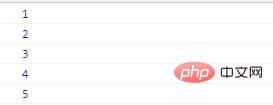
This article brings you relevant knowledge about iterators in JavaScript. Let’s take a look at what an iterator is and how to customize it. I hope it will be helpful to everyone.

The most common is the Array iterator, which returns the values in the array in order.
let arr = [1,2,3,4,5];for (let val of arr) {
console.log(val);}
So how do we implement iterators?
First of all, it needs to meet two points:
The iterable protocol allows JavaScript objects to define or customize their iteration behavior
How to satisfy the iterable protocol?
To become an iterable object, an object must implement the @@iterator method.
This means that the object (or an object on its prototype chain) must have a property with the key @@iterator, which can be accessed through the constant Symbol.iterator
That is to say To satisfy the iterable protocol, your object needs to have a property with a key named Symbol.iterator, making it an iterable object.
The iterator protocol defines a standard way to produce a sequence of values (whether a finite or infinite number).
When there are a limited number of values, after all values have been iterated, a default return value will be returned.
How to satisfy the iterator protocol?
Your object needs to implement at least one next() method, which returns an iterator object IteratorResult. This iterator object contains two properties done and ·value.
Then let’s start customizing an iterator
As mentioned above, if you want to customize the iterator Iterator needs to meet the following two conditions:
Symbol.iterator attributenext() method. This next() method returns an object containing value and done Object of properties let colors = {
blue : "蓝色",
green : "绿色",
yellow : "黄色"}colors is now a non-iterable object, we want to use for... of traverses it, then you can customize the iterator.
Next, start to implement:
colors[Symbol.iterator] = function() {
let keys = Object.keys(colors);
// 如果用 let keys = Reflect.ownKeys(colors),keys 就会包括一些不可枚举的属性
// 那么后面的 len 要减一,减去Symbol.iterator这个属性
// 根据实际情况选择使用
let len = keys.length;
let index = 0;
return {
next : function() {
if (index < len) {
return {
value : colors[keys[index++]],
done : false
}
}
return { done : true }
}
}}Let us verify it:
for (let val of colors) {
console.log(val);}
[Related recommendations: javascript Study tutorial】
The above is the detailed content of Understand what a JavaScript iterator is in ten minutes. For more information, please follow other related articles on the PHP Chinese website!